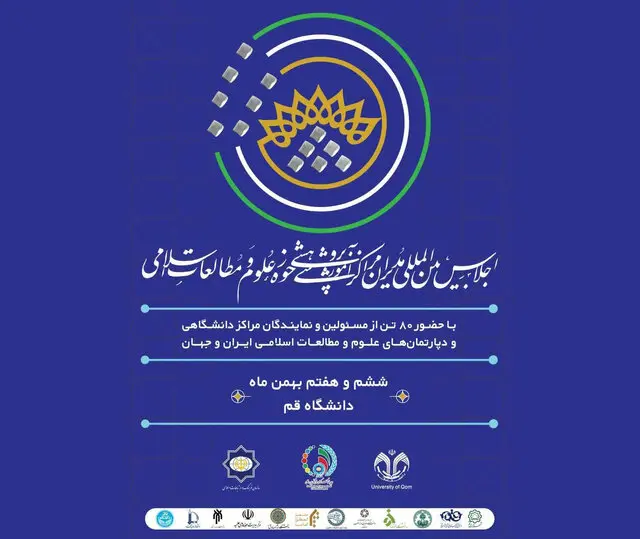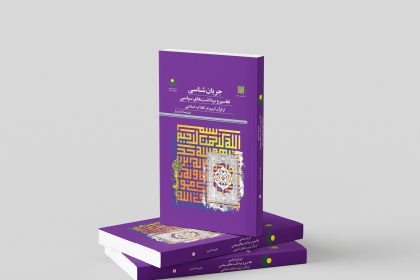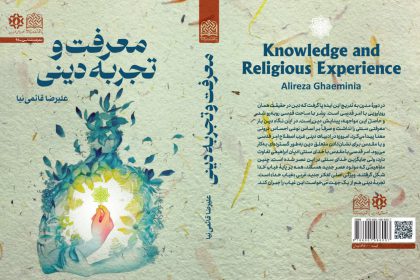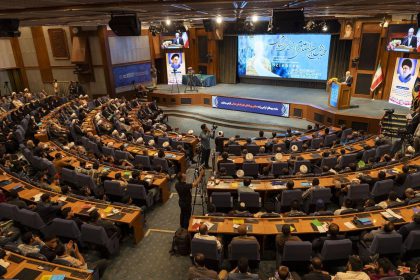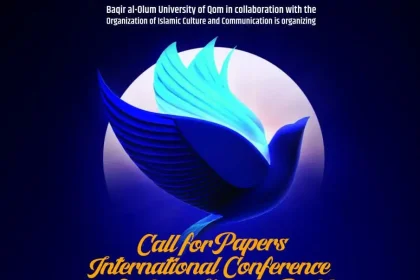Abstract
The First International Conference of Directors of Islamic Studies Centers was held at the University of Qom, bringing together over more than 200 scholars, university professors, researchers, and academic directors from 17 Islamic and non-Islamic countries.
The conference aimed to foster academic convergence among Islamic studies centers worldwide, facilitate the exchange of research achievements, showcase the scholarly capacities of the Islamic Republic of Iran, and strengthen scientific and cultural diplomacy.
Over the course of the two-day event, several specialized panels were held on themes including the Qurʾān and Qurʾānic sciences, Islamic philosophy and wisdom, comparative law and jurisprudence, Islamic management and psychology, and the role of women in Islam. The program also featured meetings with prominent Shīʿī authorities and visits to major research institutions, such as the Noor Computer Research Center for Islamic Sciences.
The conference’s principal outcome was a shared commitment to establishing an international network of Islamic studies centers, launching joint scholarly initiatives, and fostering a communication bridge among intellectuals across the Muslim world.
Introduction
In recent decades, the Islamic world has confronted a variety of challenges, including extremism, a growing unfamiliarity with its authentic heritage, a crisis of religious identity among younger generations, and limitations in the production of indigenous knowledge. A key strategy for addressing these concerns lies in strengthening international collaboration among academic and research institutions. 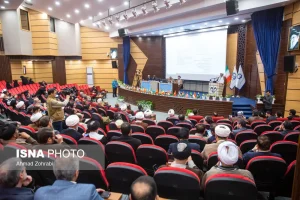
On this basis, the First International Conference of Directors of Educational and Research Centers in the Field of Islamic Studies was convened under the theme “Civilizational Islamic Education: Opportunities and Potentials for Academic and Cultural Cooperation.” The event, held on 26–27 January 2025 at Shaykh Mufīd Hall of the University of Qom, aimed to identify the capacities and opportunities of Islamic studies centers across the Muslim world, showcase Iran’s scholarly achievements in this field, and address existing gaps, shortcomings, and needs.
The conference brought together a distinguished assembly of intellectuals and directors of Islamic academic centers from 17 countries. Prominent Iranian institutions—including the University of Qom, the University of Tehran, Jāmiʿat al-Muṣṭafā, Imām Ṣādiq University, and the University of Religions and Denominations—were represented. In addition, participants from countries such as Pakistan, Lebanon, Senegal, Tunisia, Indonesia, Russia, and Kazakhstan presented the capacities and experiences of their respective centers.
The event was jointly organized by the University of Qom, the Islamic Culture and Relations Organization, seminaries across Iran, and several research institutes. Its principal objectives included the establishment of a cohesive network of Islamic studies centers, the strengthening of scholarly and cultural solidarity across the Muslim world, the promotion of research diplomacy, and the facilitation of international and interdisciplinary collaboration. The participation of more than forty international scholars, alongside numerous academic directors, highlighted the global significance of this initiative.
Opening Ceremony
The conference opened at Shaykh Mufīd Hall with the participation of University of Qom authorities, Iranian scholars, and international representatives. In his opening address, Dr. Ahmad-Hossein Sharifi, President of the University of Qom, welcomed the guests and underscored the importance of establishing a global network of Islamic studies centers to reinforce scientific and cultural solidarity across the Islamic world. He also emphasized the need to draw upon Iran’s academic and research capacities to expand international cooperation.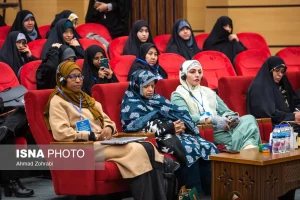
Subsequently, Hojjat al-Islam Mohammad-Mahdi Imanipour, Head of the Islamic Culture and Relations Organization, highlighted Iran’s role in advancing Islamic sciences and studies throughout the Muslim world. He emphasized the importance of launching joint scientific projects and integrating modern technologies into the development of religious studies. He further observed that academic collaboration between universities and research centers can open new horizons for fostering religiosity, promoting Islamic culture, and advancing the humanities.
Following these addresses, representatives from various countries showcased the capacities of their institutions and proposed potential areas for collaboration. The discussions underscored the need for greater coordination among Islamic centers, the strengthening of scholarly research, the response to cultural challenges, and the establishment of international academic and educational networks. This segment of the program set the stage for the commencement of specialized sessions and exchanges among researchers and directors of educational institutions.
Specialized Sessions – Day One
The first day of the conference featured specialized sessions focused on three major themes: Qurʾānic sciences, legal studies and the status of women in Islam, and Islamic philosophy and wisdom.
In the first theme on Qurʾānic sciences and research, the representative of Ez-Zitouna University in Tunisia introduced the institution’s capacities, noting that it hosts three independent and active centers dedicated to Qurʾānic research, which maintain close collaborations with academic institutions across the Muslim world. Addressing contemporary cultural and intellectual challenges, he underscored the necessity of interfaith cultural cooperation and the role of such conferences in fostering academic diplomacy in the Islamic world. This was followed by Dr. Khalia Haydara from Cheikh Anta Diop University in Senegal, who presented her country’s academic experiences, introducing specialized programs in Islamic philosophy and Qurʾānic studies. She further stressed that strengthening academic solidarity between African Islamic centers and other Muslim countries is essential for elevating the intellectual standing of Muslims globally.
The second theme, legal studies and the status of women in Islam, was addressed by Dr. Zahra Sadat Mirhashemi, Dean of the Faculty of Theology at Al-Zahra University. She devoted her lecture to analyzing the issue of women in Islamic thought. Critiquing two dominant contemporary paradigms—the traditional woman and the feminist woman—she emphasized the necessity of proposing a “third model of the Muslim woman,” rooted in Islamic teachings and capable of serving as a new foundation for civilizational development in the modern world. Dr. Mirhashemi also highlighted the exemplary roles of prominent women in Islamic history, such as Fāṭima al-Zahrāʾ (a), Khadīja (a), and Fāṭima al-Maʿṣūma, as key figures in reviving the identity of Muslim women and presenting Islam to the world.
The third theme, Islamic philosophy and wisdom, included a detailed report by Hojjat al-Islam Dr. Mahdi Abdollahi from the Iranian Institute of Philosophy. He outlined five major developments in Islamic philosophy after the Islamic Revolution: the continuation and strengthening of Transcendent Philosophy (al-Ḥikma al-Mutaʿāliya), the expansion of comparative studies between Islamic and Western philosophy, the establishment of new branches of the ‘philosophy of …’ disciplines, the creation and growth of philosophical journals and encyclopedias, and the application of Islamic philosophy in theology and kalām. Dr. Abdollahi emphasized that these achievements were the outcome of the establishment of numerous research institutions in Iran and the dedicated efforts of scholars. Following his lecture, Dr. Bekzhan Meirbaev, Dean of the Faculty of Philosophy and Political Science at Farabi University in Kazakhstan, stressed the necessity of deepening interfaith dialogue and strengthening philosophical collaboration across the Islamic world. He also extended an invitation to participants to attend the annual conference of the Philosophy Association at Farabi University.
Specialized Sessions – Day Two
The second day of the conference was devoted to the continuation of specialized discussions and collaborative panels. In these sessions, representatives from Pakistan, Indonesia, and Lebanon presented the academic and research capacities of their universities and explored common areas of cooperation. A central theme was the necessity of launching joint projects in fields such as ḥadīth and sīra (the Prophet’s life and conduct), Islamic philosophy, and comparative studies among universities in the Muslim world. Participants emphasized that such initiatives could represent a significant step toward academic synergy and the advancement of Islamic studies at the international level.
Within this framework, the representative of Iqbal Lahori University in Pakistan introduced the institution’s diverse programs in Islamic disciplines across different levels of study. He highlighted Pakistan’s special focus on Qurʾānic sciences and religious studies, and called for expanding academic relations between Pakistani and Iranian institutions. Such cooperation, he argued, could strengthen scholarly exchanges, facilitate faculty and student mobility, and promote joint research.
Following this, Dr. Azam Bakhtiar, professor at Sadra Islamic College in Jakarta and director of the Nūr al-Wilā ʾ Research Institute in Indonesia, focused his presentation on the importance of Sufi studies and the critique of emerging sectarian movements in Southeast Asia. Drawing on Indonesia’s experience in engaging with diverse intellectual currents, he underscored the need for close cooperation among academic and religious institutions across the Muslim world.
A group of Lebanese professors also pointed to their country’s strategic role in the Islamic world and emphasized the necessity of training new Islamic elites in the region, as well as establishing interdisciplinary programs in Islamic studies and the humanities. They considered this approach a response to the intellectual and social needs of young Muslims in the contemporary era.
The sessions later turned to Islamic psychology and the study of women and family lifestyles. These discussions examined scholarly, pedagogical, and research developments in the field of Islamic psychology and the role of religion in shaping life patterns.
Hojjat al-Islam Dr. Masʿoud Azarbaijani, professor of psychology at the Research Institute for Ḥawza and University, introduced the structure, academic groups, and research activities of the institute. He emphasized that Islamic psychology programs have been developed at both undergraduate and master’s levels, with objectives including the transmission of Islamic norms and values, the training of researchers, and the promotion of spiritual and ethical quality of life. Dr. Azarbaijani also elaborated on narrative-based and rational-empirical approaches in Islamic psychology, outlining the four stages of the discipline’s development since 2000: preparation, refinement, comparison, and establishment.
This panel also featured contributions from Dr. Sanaullah (University of Bangladesh), Dr. Haydar Tamimi (University of Baghdad), and Dr. Shahzadi Pakeeza (Fatima Jinnah Women University, Pakistan), who discussed Islamic lifestyles and the status of women within the family. Hojjat al-Islam Mohammad-Reza Salarifar highlighted the role of the family in the elevation and well-being of women, analyzing the family system in post-revolutionary Iran based on Qurʾānic teachings.
Dr. Habibzadeh, a faculty member at the University of Qom, highlighted the department’s two decades of experience in education and expressed its readiness to collaborate with other countries in the fields of Islamic psychology and family studies, outlining research priorities in these areas.
In another session, Hojjat al-Islam Mohammad-Reza Barteh, head of the Secretariat of Scientific Poles and Associations of the Ḥawza, described the structural and research activities of the Islamic seminaries. He noted that the seminaries operate in both structural and governance dimensions, with a central core consisting of the Deputyships for Education, Research, Preaching, Training and Refinement, and International Relations. He added that in the field of education, 498 seminaries, 90 higher institutes, and 10 seminary-affiliated universities operate under this framework, with the regulation and implementation of the training process for seminarians being among the main responsibilities of the Deputyship for Education. In the field of research, around 260 specialized academic journals are published by the seminaries, and more than 20 universities and research institutes are affiliated with them. In addition, digital platforms, scientific reference websites, social networks, and libraries such as the Ayatollah Marʿashi Library play a vital role in supporting seminary research.
The day concluded with discussions highlighting the interaction between seminaries, universities, and international centers. The presence of representatives from diverse countries enabled opportunities for academic, research, and cultural cooperation between various institutions, contributing to knowledge exchange and the development of joint projects in the fields of humanities, philosophy, kalām, Qurʾān, and ḥadīth studies.
Official Visits and Meetings During the Conference
On the final day of the conference, a delegation of university professors and directors of Islamic studies centers from various countries met with Ayatollah Javadi Amoli. This meeting provided an opportunity to exchange views on strategies for strengthening Islamic studies and promoting scholarly and cultural research, as well as to present international perspectives on the field of Islamic sciences and studies.
Participants also visited the Noor Computer Research Center for Islamic Sciences, where they were introduced to the center’s digital and research capabilities, ongoing projects, and electronic academic resources. Representatives from foreign institutions expressed strong interest in Iran’s potential for research in Qurʾānic studies, theology, philosophy, and the humanities. They emphasized the importance of employing modern technologies and expanding digital collaboration.
These visits and meetings were regarded as a practical platform for expanding scientific and cultural networks among Islamic centers worldwide. Participants underscored the need to enhance collaboration among research institutes, universities, and seminaries in order to pursue international scholarly and cultural projects in a sustained and effective manner.
Conclusion
The First International Conference of Directors of Educational and Research Centers in Islamic Studies, attended by more than 40 scholars and directors from 17 countries, created a valuable opportunity to exchange experiences, present institutional capacities, and identify the research needs of the Islamic world. One of the most important outcomes of the conference was the recognition of the necessity to establish a coherent international network of Islamic studies centers that could strengthen scholarly, cultural, and research solidarity among Muslim countries.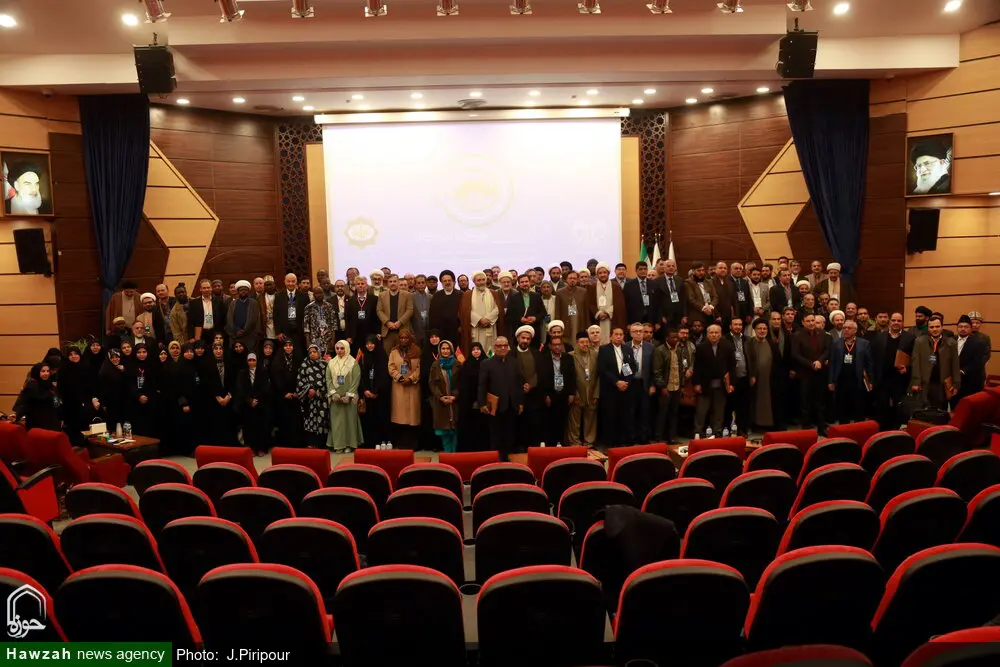
From an academic perspective, the conference highlighted developments in Qurʾānic and religious studies in post-revolutionary Iran, including the establishment of numerous programs in Qurʾānic studies, the publication of specialized commentaries, the translation of the Qurʾān into 18 languages, and the defense of nearly 15,000 graduate-level theses related to the Qurʾān. Transformations in Islamic philosophy and wisdom were also addressed, with emphasis on five key dimensions: the continuity of the Transcendent Philosophy (al-Ḥikma al-Mutaʿāliya), the expansion of comparative studies, the establishment of new branches of the ‘philosophy of …’ disciplines, the creation and growth of philosophical journals and encyclopedias, and the application of Islamic philosophy in theology and kalām.
In the field of comparative and interdisciplinary studies, the conference stressed the importance of examining new religious sects and movements, advancing Sufi studies, promoting comparative theology, and addressing the status of women in Islam. Proposals included articulating a “third model of the Muslim woman” inspired by exemplary women in Islamic history, alongside giving attention to Islamic psychology, family studies, and Islamic lifestyle.
Overall, the outcomes of the conference outlined a framework for strengthening scholarly, research, and cultural cooperation among Islamic centers worldwide, while highlighting the role of modern technologies in advancing studies in religion and the humanities.

